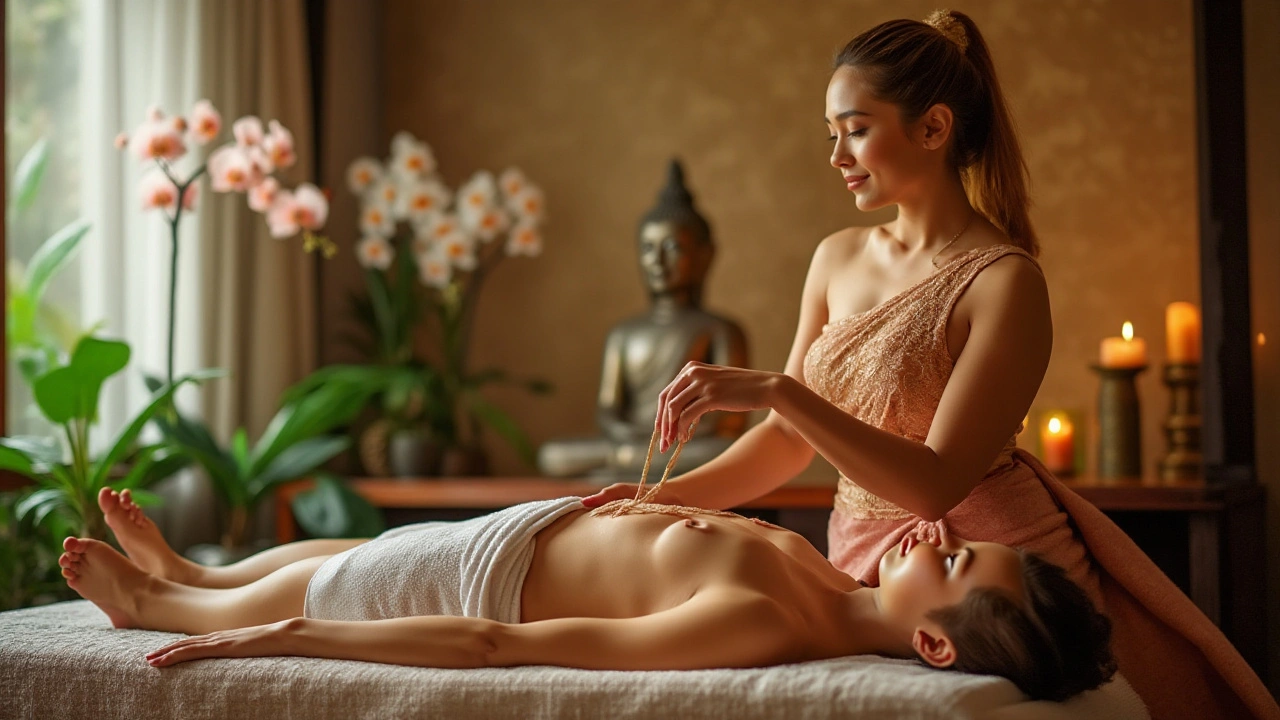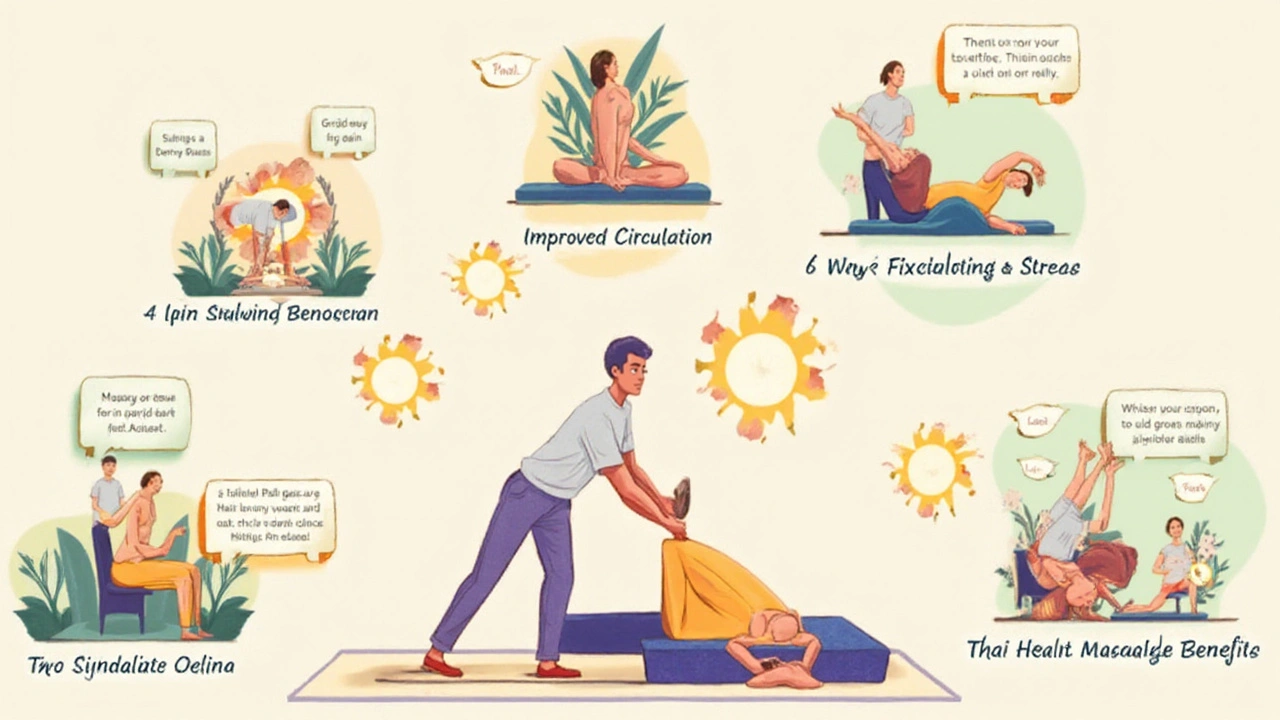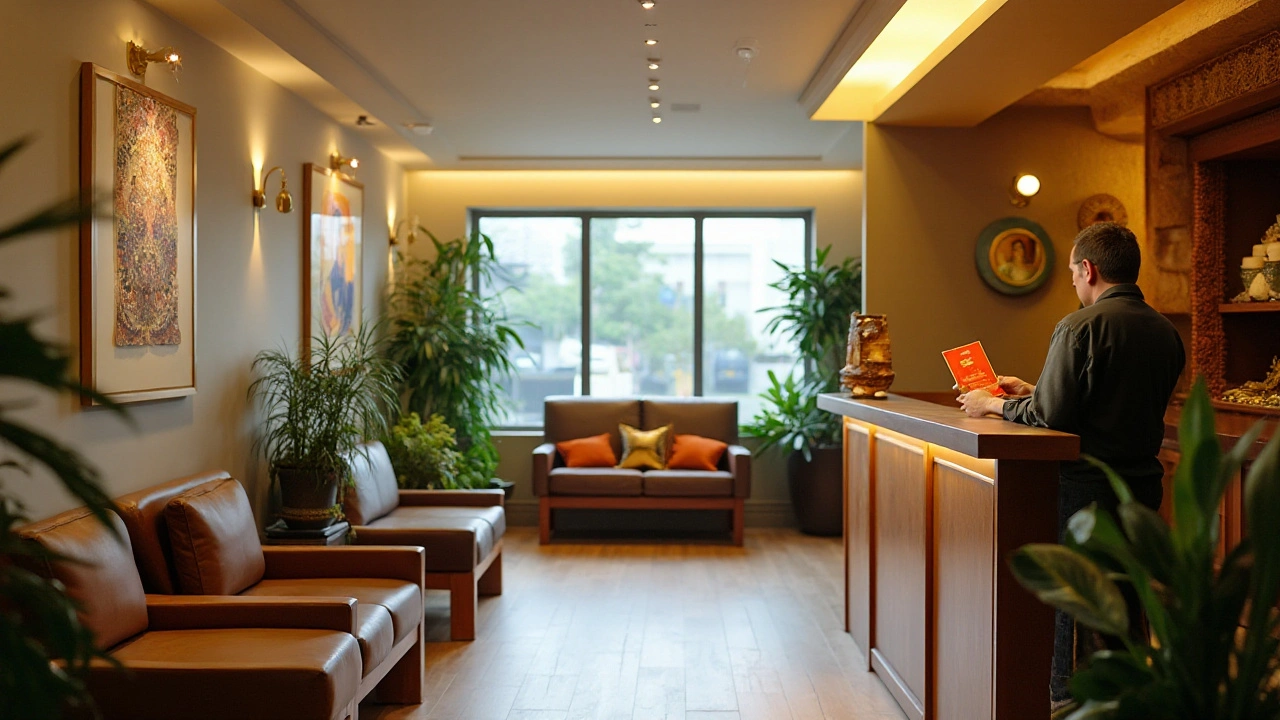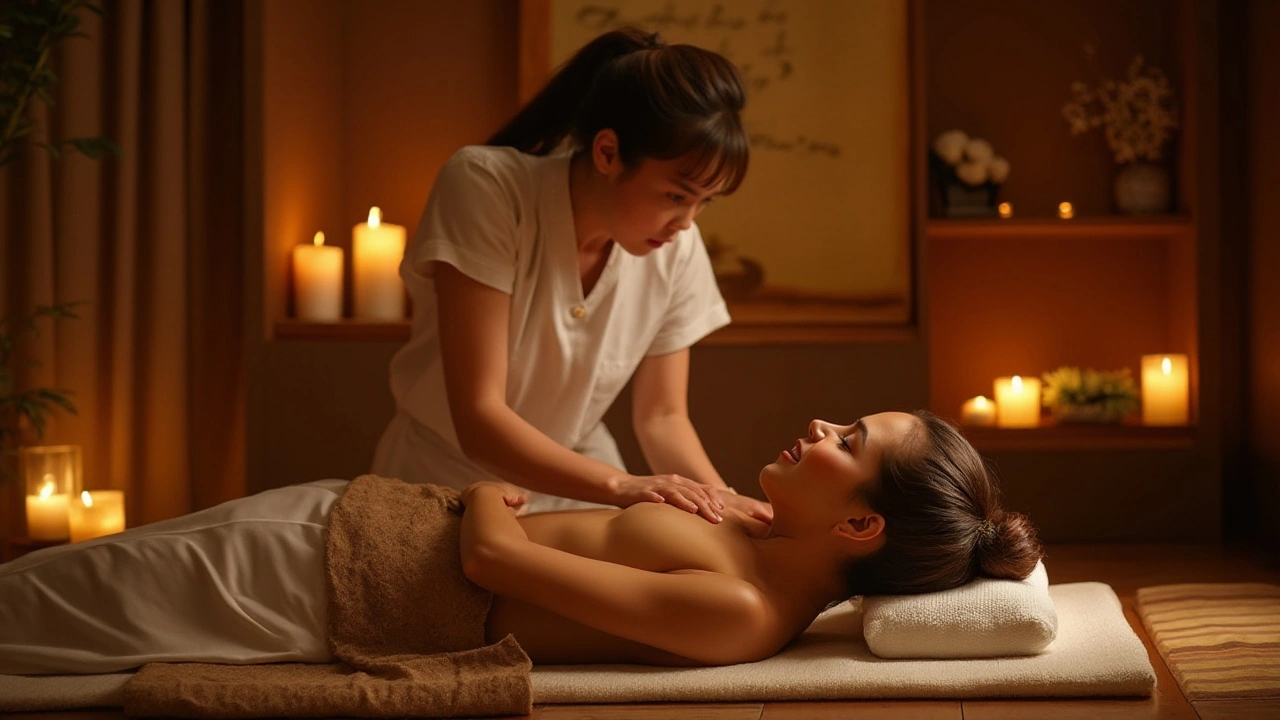If you're craving a blend of relaxation and rejuvenation, Thai massage might just be what you need. It's an ancient therapy combining acupressure, Indian Ayurvedic principles, and assisted yoga postures. Unlike your typical massage on a table, Thai massage usually takes place on a mat on the floor, allowing the practitioner to use their body to move you into various positions.
In some ways, it's like doing yoga without any effort on your part. Which sounds pretty fantastic, right?
There are some great health benefits associated with Thai massage that might surprise you. From boosting your circulation and flexibility to helping with chronic pain and stress relief, this form of massage covers it all. It's particularly effective for those who spend long hours sitting or anyone looking to improve their range of motion.
Before you book an appointment, it's good to know what to expect. A typical session lasts about 90 minutes, and you stay fully clothed throughout the process. The practitioner uses their hands, knees, legs, and feet to move you into a series of stretches. It's a full-body experience that leaves you feeling relaxed and energized simultaneously.
Lastly, choosing the right practitioner is crucial for a fantastic Thai massage experience. Seek recommendations, read reviews, and opt for certified professionals who have undergone proper training. Your body will thank you for it!
- Understanding Thai Massage
- Health Benefits You Didn't Know About
- What to Expect During a Session
- Tips for Choosing Your Practitioner
Understanding Thai Massage
Thai massage, also known as Nuad Thai, is a lineage with over 2,500 years of history. Originating from Thailand, it was influenced by traditional Chinese medicine and Indian Ayurvedic practices. This unique form of therapy employs acupressure, gentle compression, and assisted yoga postures, setting it apart from other types of massage that primarily focus on muscle relaxation through kneading techniques.
What's fascinating about Thai massage is its holistic approach. Unlike Western massages that often target specific problem areas, Thai massage works on the entire body, energy lines, and pressure points to promote overall wellness. This is rooted in the belief that the body has 'sen' or energy lines, much like the meridian lines in acupuncture. Working on these lines helps to clear blockages, balance energy, and restore physical, mental, and emotional well-being.
If you're picturing a serene room with low lighting and soft background music, you're right. But what makes Thai massage distinct is that it takes place on a floor mat instead of a massage table. This allows the practitioner to use their body weight effectively, incorporating rhythmic movement and stretches. Often likened to 'lazy man's yoga,' this method is both passive and dynamic, which means you experience deep stretches without having to make any effort.
The technique involves various parts of the practitioner's body, like their hands, elbows, knees, and feet. It's a full-body workout led by the therapist. The recipient remains fully clothed in loose, comfortable attire, which allows freedom of movement.
Dr. C. Pierce Salguero, a well-known author in the field, once wrote, 'Thai massage is not just a physical exercise; it’s a form of cultural expression that conveys spiritual and philosophical ideas.'
The benefits of this ancient practice are numerous. It helps with muscle relaxation, reduces chronic pain, enhances flexibility, and improves circulation. Beyond these physical perks, it has been known to alleviate stress, anxiety, and even insomnia. Many spa-goers report feeling both relaxed and invigorated post-session, a testament to its holistic benefits.
Thai massage can be especially beneficial for those who spend long hours seated or have a sedentary lifestyle. It encourages movement and stretching, which helps to release tension built up over prolonged periods of inactivity. Athletes also find it useful for its ability to enhance physical performance and prevent injuries.

Health Benefits You Didn't Know About
When you think about Thai massage, your mind may wander to images of gentle stretches and serene moments of relaxation. But did you know this ancient practice offers a plethora of health benefits that go well beyond just unwinding? Let’s dive deep into some lesser-known perks that make Thai massage a powerhouse for your health.
Firstly, one of the standout benefits is its ability to boost your blood circulation. The rhythmic pressure and gentle stretches applied during a session work wonders in enhancing blood flow. Increased blood circulation means your cells get more oxygen and nutrients, helping your body to heal and function better. This can be especially beneficial for those dealing with circulation issues or who suffer from cold hands and feet.
Additionally, Thai massage can dramatically improve your flexibility. Remember those stretches the practitioner guides you through? They’re based on yoga postures designed to elongate muscles and release tension. Over time, this can positively impact your range of motion, making everyday movements easier and reducing the risk of injuries. It's no surprise that many athletes incorporate Thai massage into their routines.
Chronic pain relief is another exceptional benefit. By targeting specific pressure points, Thai massage effectively alleviates pain. For instance, it can be especially helpful for those suffering from sciatica, lower back pain, and migraines. Combining acupressure with stretching can unblock energy channels in the body, offering a drug-free way to manage pain.
Let's not forget about mental health. Thai massage has profound effects on stress and anxiety levels. The mindful, meditative aspect of the therapy helps you to tune out daily stressors. During a session, the body's parasympathetic nervous system is activated, promoting a state of relaxation and alleviating stress. This can lead to improved sleep patterns, reduced anxiety, and a general sense of well-being.
In terms of digestion, the benefits might surprise you. Certain techniques used in Thai massage stimulate the digestive system, promoting better digestive health. Regular sessions can help alleviate conditions like irritable bowel syndrome (IBS) and constipation. It’s a holistic approach to gut health that complements dietary and lifestyle changes.
“Thai massage is unique in its approach, often described as ‘lazy man’s yoga.’ It not only soothes muscles but also enhances physical and emotional well-being,” says Dr. Gregory Lewis, a renowned expert in holistic healthcare.
Moreover, this type of massage can strengthen your immune system. By reducing stress and improving circulation, your body becomes more efficient at fighting off illness. The techniques help in detoxifying your body, flushing out toxins that can make you feel sluggish and more susceptible to illnesses.
In a nutshell, the health benefits of Thai massage extend beyond relaxation to offer a full spectrum of physical, mental, and emotional boosts. Whether you're an athlete looking to enhance performance, someone dealing with chronic pain, or simply seeking a holistic approach to well-being, Thai massage has something to offer. It’s an investment in your health that yields both immediate and long-term rewards.

What to Expect During a Session
Walking into a Thai massage session for the first time can be an exciting yet mysterious experience. From the moment you step into the serene environment, a sense of calm and tranquility usually wraps around you. Practitioners often start by having a brief chat with you about any aches, pains, or specific areas of concern you might have. This conversation helps tailor the session to your unique needs, ensuring that the maximum benefit is achieved.
A critical first step involves getting comfortable with the setting. Rather than lying on a traditional massage table, you’ll usually find yourself on a soft mat placed on the floor. This allows the practitioner to move freely around you, which is essential for the technique. You’ll stay fully clothed in loose-fitting attire, allowing you to move easily through the various positions you’ll be guided into.
The session often begins with gentle rocking and rhythmic compressions along your body's energy lines, known as “Sen” lines in Thai medicine. This is typically followed by deep stretching movements. The practitioner might guide your limbs into yoga-like positions while applying firm pressure with their hands, elbows, or even feet. It may sound intense, but it's usually deeply relaxing and rejuvenating.
Each practitioner has their own style, adding a personal touch to the traditional techniques. Some might incorporate soothing oils or herbal compresses, while others might focus on specific problem areas more intensively. Don’t be surprised if you hear clicks or pops during the stretches – it’s just your body releasing built-up tension.
Expect to spend around 90 minutes to two hours for a full session. This extended time allows for a thorough, unhurried process that addresses the entire body. You might feel a bit sore afterward, similar to a good workout, but this should dissipate within a day or two. The overall sense of well-being and lightness you'll feel, however, often lasts much longer.
As one practitioner puts it,
“Thai massage is a dance for health, blending fluid movements with applied mindfulness to heal both the body and the spirit.”This poetic description underscores the physical and emotional benefits that go beyond mere relaxation.
Finally, hydration is crucial. Drink plenty of water before and after your session to help flush out the toxins released during the massage. It’s also a good idea to take it easy for the rest of the day, allowing your body to fully benefit from the therapy. This holistic approach ensures that Thai massage is not just a treatment but an experience that nurtures your entire being.

Tips for Choosing Your Practitioner
Selecting the right practitioner for your Thai massage experience can make all the difference between just a good session and a transformative one. The first thing to look for is the practitioner’s credentials. While Thailand is the home of authentic Thai massage, many skilled practitioners are certified through recognized programs around the world. Look for certifications from institutions that teach traditional Thai massage. One recognized institution is the Wat Po Traditional Medical School in Bangkok.
Personal recommendations can be gold when searching for a great practitioner. Ask friends, family, or colleagues who have experienced Thai massage and get their input. Online reviews and testimonials can be incredibly helpful too. Websites like Yelp or Google Reviews show user experiences and can guide you toward a reputable therapist. Look for consistent positive feedback regarding the therapist’s skill, professionalism, and how they make clients feel during and after the session.
Once you have some potential candidates, don't hesitate to reach out and ask them questions directly. Inquire about how long they have been practicing and their training background. Thai massage is quite different from other forms of massage, involving significant movement and stretching. An experienced practitioner should clearly explain what to expect, including any preparatory steps or instructions.
An often overlooked but crucial aspect is the practitioner's ability to communicate well. Good communication helps tailor the session to your specific needs, whether you're looking for deep tissue work in sore areas or a lighter touch for relaxation. They should also be attentive to your comfort levels during the stretches and ask for feedback throughout the session.
The environment where the massage takes place is also important. A clean, quiet, and comfortable setting can greatly enhance your relaxation experience. It’s worth visiting the place beforehand to check the ambiance. Pay attention to details like room cleanliness, the comfort of the mat, and even the practitioner's demeanor and professionalism.
Master practitioner Pichest Boonthume once said, "A good Thai massage is more than technique; it’s about the connection between the therapist and the client."
Lastly, costs can vary widely, but this shouldn't be the only factor you consider. While it’s tempting to go for cheaper options, remember that you often get what you pay for. Invest in a practitioner who is skilled and reputable even if they charge a bit more. After all, your health and wellness are worth it.
A useful tip is to look for package deals or memberships if you plan to make Thai massage a regular part of your self-care routine. This can save you some money while ensuring you have consistent sessions with a trusted practitioner.
